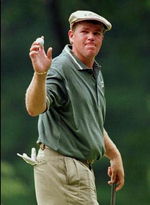Daily Record (Morris County, New Jersey), August 22, 1997, p. A19
Golfer can't blame all his problems on drinking
Stanton Peele
 The recent PGA tournament provided another chapter for those who follow the career of professional golfer John Daly. Daly, whose well-publicized misbehavior on the tour he blames on his alcoholism, led the PGA field after the first round. He completed his four-under-par 66 with birdies on the final three holes of the difficult Winged Foot Golf Club outside New York City.
The recent PGA tournament provided another chapter for those who follow the career of professional golfer John Daly. Daly, whose well-publicized misbehavior on the tour he blames on his alcoholism, led the PGA field after the first round. He completed his four-under-par 66 with birdies on the final three holes of the difficult Winged Foot Golf Club outside New York City.
However, following the first round, Daly's game began to deteriorate, capped by a third-round score of 77. Now out of contention, he drove a ball out of bounds, following which he threw his club into the woods in disgust. This fit of pique required a couple of officials to scramble over a chain-link fence in order to retrieve the club.
Although on the final round he recaptured his golf form (shooting a 70), Daly was unable to complete the tournament without another incident. He became irritated and had an argument with a rules official after snapping a drive and failing to get relief from the official. After his promising start, Daly finished far back in the tournament, tied for 29th position overall.
This tournament becomes one of a long list of Daly excursions into rudeness and failure. Daly had exceptional golfing success at a young age, but he also has had major problems controlling himself. He has dropped out of matches, had a fist fight with an elderly spectator, and several times tried unsuccessfully to quit drinking, which he and others recognized was a problem for him.
Entering the PGA, Daly indicated he was on the road to recovery after a six-week stay at the Betty Ford Center earlier this year. But during Daly's latest, longest period of abstinence, much else has gone wrong for him. Indeed, in many ways his problems have worsened.
The month after Daly returned from Betty Ford, his second wife left him. Apparently, drinking or not drinking was not the central problem in their relationship. Shortly after this, Daly walked off the course at the US Open halfway through a round, just as he used to do when he was drinking. Daly gave no explanation to tournament organizers, his caddy, or his fellow golfers.
Between his treatment and his outbursts, Daly's performance on the golf course hasn't been up to par this year. He is ranked 138 among PGA golfers. This amounts to $103,954 in earnings. While this might be good enough for you and me, it does not begin to cover Daly's debts.
This is because, since his addiction treatment, Daly has gotten into new trouble that he didn't have before. In the short time he has been sober, Daly built up tremendous gambling debts. "When I quit drinking, I started gambling. It's called cross-addiction." He resolved this new problem by signing a $10 million contract with a golfing sponsor. Daly announced that the chairman of the company, Ely Callaway, "made my gambling debts go away. I wouldn't have to worry about them."
Addiction treatment, although it may cause some people to stop drinking, apparently does not lead them necessarily to become responsible adults. In order to maintain his pledge not to drink, Daly insists that the golfers that he hangs around with also abstain. Daly announced with pride, "Fuzzy (Zoeller) drinks a little bit, but he told me, 'I'll never drink in front of you again.' That's the kind of people I need to be around!"
What about self-control? Will all of us have to give up things we do in a pleasurable and controlled manner for fear of those who cannot control themselves? This is the logic behind much of modern medicine's labeling of problem behaviors as diseases.
The Daly case illustrates how we have put the cart before the horse in the case of addiction. Drugs and alcohol are ubiquitous. We assume that these are the cause of our problems, or those of problematic individuals like Daly. This provides a ready excuse for their foibles. But it does little to clarify the nature of addiction.
What John Daly shows us instead is that, for many people, misbehavior with drugs and alcohol is part of a larger package. Not being able to control their behavior in many areas, it is of little surprise that they misuse substances like alcohol.
We can call alcoholism and addiction diseases if we like. But will that help people like Daly to stop throwing clubs, to respect other people, and to take responsibility for their actions? So far, graduating from the best-known addiction treatment center in the world shows no signs of enabling him to accomplish these things.





